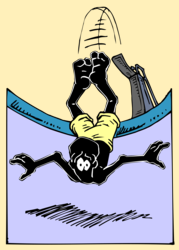 This is the sixth in a weekly series of posts exploring themes raised in Dambisa Moyo’s book Dead Aid. Depressingly, I find many — but not all — of Moyo’s arguments concerning the negative effect of aid to be convincing. There are numerous different ways in which foreign aid tends to have the unintentional effect of reducing economic growth, rather than promoting it. In Part II of the book, Moyo outlines the things that Africa should do instead of seeking foreign aid.
This is the sixth in a weekly series of posts exploring themes raised in Dambisa Moyo’s book Dead Aid. Depressingly, I find many — but not all — of Moyo’s arguments concerning the negative effect of aid to be convincing. There are numerous different ways in which foreign aid tends to have the unintentional effect of reducing economic growth, rather than promoting it. In Part II of the book, Moyo outlines the things that Africa should do instead of seeking foreign aid.
Unfortunately, I am doubtful about the likely effectiveness of the remedies which Moyo prescribes. She proposes weaning Africa off aid over a period of five to ten years — undoubtedly a laudable goal. However, her first suggestion is that African countries seek funding from international capital markets by issuing government bonds. While I agree that capital markets are a useful source of funds for healthy governments, I have some difficulty in seeing how money borrowed from capital markets will discourage kleptocratic tendencies to a greater extent than money borrowed from the World Bank.
If the leaders of a country see personal enrichment as their primary goal, with the well-being of the country being no more than a subsidiary bonus if it should accidentally occur, why should they be concerned about whether the country repays its debts or not, particularly if the debts are going to be repayable some time in the distant future? I would be inclined to regard a country’s accessing capital markets as a symptom of improving economic health rather than a cause.